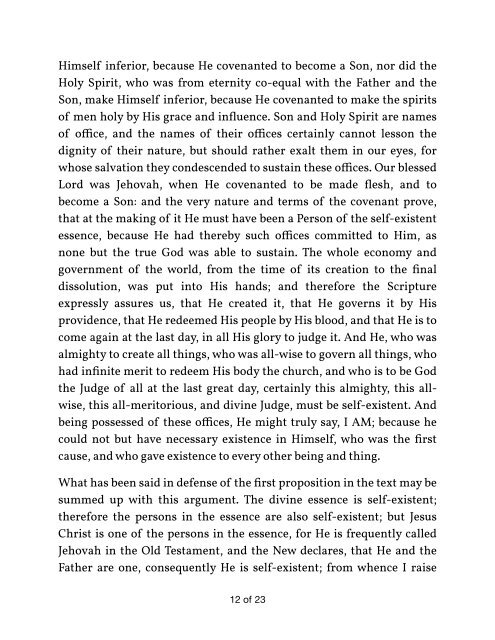The Self-Existence of Jesus Christ
William Romaine (1714-1795), was An influential and much-loved British preacher and lecturer in theology who held strong views on the deity and eternal self-existence of the Lord Jesus. He played a big part in the evangelical revival in England. On his death John Newton said of him that he was “inflexible as an iron pillar in publishing the truth, and unmoved either by the smiles or frowns of the world.”
William Romaine (1714-1795), was An influential and much-loved British preacher and lecturer in theology who held strong views on the deity and eternal self-existence of the Lord Jesus. He played a big part in the evangelical revival in England. On his death John Newton said of him that he was “inflexible as an iron pillar in publishing the truth, and unmoved either by the smiles or frowns of the world.”
You also want an ePaper? Increase the reach of your titles
YUMPU automatically turns print PDFs into web optimized ePapers that Google loves.
Himself inferior, because He covenanted to become a Son, nor did the<br />
Holy Spirit, who was from eternity co-equal with the Father and the<br />
Son, make Himself inferior, because He covenanted to make the spirits<br />
<strong>of</strong> men holy by His grace and influence. Son and Holy Spirit are names<br />
<strong>of</strong> <strong>of</strong>fice, and the names <strong>of</strong> their <strong>of</strong>fices certainly cannot lesson the<br />
dignity <strong>of</strong> their nature, but should rather exalt them in our eyes, for<br />
whose salvation they condescended to sustain these <strong>of</strong>fices. Our blessed<br />
Lord was Jehovah, when He covenanted to be made flesh, and to<br />
become a Son: and the very nature and terms <strong>of</strong> the covenant prove,<br />
that at the making <strong>of</strong> it He must have been a Person <strong>of</strong> the self-existent<br />
essence, because He had thereby such <strong>of</strong>fices committed to Him, as<br />
none but the true God was able to sustain. <strong>The</strong> whole economy and<br />
government <strong>of</strong> the world, from the time <strong>of</strong> its creation to the final<br />
dissolution, was put into His hands; and therefore the Scripture<br />
expressly assures us, that He created it, that He governs it by His<br />
providence, that He redeemed His people by His blood, and that He is to<br />
come again at the last day, in all His glory to judge it. And He, who was<br />
almighty to create all things, who was all-wise to govern all things, who<br />
had infinite merit to redeem His body the church, and who is to be God<br />
the Judge <strong>of</strong> all at the last great day, certainly this almighty, this allwise,<br />
this all-meritorious, and divine Judge, must be self-existent. And<br />
being possessed <strong>of</strong> these <strong>of</strong>fices, He might truly say, I AM; because he<br />
could not but have necessary existence in Himself, who was the first<br />
cause, and who gave existence to every other being and thing.<br />
What has been said in defense <strong>of</strong> the first proposition in the text may be<br />
summed up with this argument. <strong>The</strong> divine essence is self-existent;<br />
therefore the persons in the essence are also self-existent; but <strong>Jesus</strong><br />
<strong>Christ</strong> is one <strong>of</strong> the persons in the essence, for He is frequently called<br />
Jehovah in the Old Testament, and the New declares, that He and the<br />
Father are one, consequently He is self-existent; from whence I raise<br />
12 <strong>of</strong> 23

















